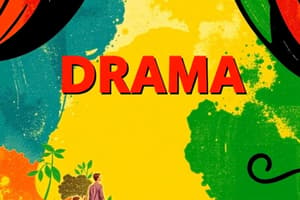Podcast
Questions and Answers
What is the primary purpose of a drama?
What is the primary purpose of a drama?
- To entertain the audience with music and dance
- To tell a story through action, dialogue, and character development (correct)
- To provide a visual representation of a historical event
- To convey a message through narration
What is the term for the sequence of events that make up the narrative of a story?
What is the term for the sequence of events that make up the narrative of a story?
- Setting
- Character development
- Plot (correct)
- Conflict
What is the term for the people involved in a story, including their motivations and goals?
What is the term for the people involved in a story, including their motivations and goals?
- Plot
- Dialogue
- Setting
- Characters (correct)
What is the term for the time and place in which a story takes place?
What is the term for the time and place in which a story takes place?
What is the term for the problem or challenge that drives the plot and characters' actions?
What is the term for the problem or challenge that drives the plot and characters' actions?
What is the term for a serious drama that ends in defeat or catastrophe for the protagonist?
What is the term for a serious drama that ends in defeat or catastrophe for the protagonist?
What is the term for a speech by a single character, often used to convey thoughts, feelings, or backstory?
What is the term for a speech by a single character, often used to convey thoughts, feelings, or backstory?
What is the term for a comment or thought spoken by a character, often to the audience, that is not heard by other characters?
What is the term for a comment or thought spoken by a character, often to the audience, that is not heard by other characters?
What is the term for when the audience knows something that the characters do not?
What is the term for when the audience knows something that the characters do not?
What is the term for the underlying message or idea that a story conveys?
What is the term for the underlying message or idea that a story conveys?
Flashcards are hidden until you start studying
Study Notes
Drama Elements in Creative Writing
Definition of Drama
- A form of writing that tells a story through action, dialogue, and character development
- Typically written to be performed on stage or screen
Key Elements of Drama
- Plot: The sequence of events that make up the narrative of the story
- Character: The people involved in the story, including their motivations, goals, and conflicts
- Dialogue: The words spoken by the characters to convey emotions, intentions, and relationships
- Setting: The time and place in which the story takes place
- Conflict: The problem or challenge that drives the plot and characters' actions
- Theme: The underlying message or idea that the story conveys
Types of Drama
- Tragedy: A serious drama that ends in defeat or catastrophe for the protagonist
- Comedy: A lighthearted drama that often ends in a happy resolution
- Melodrama: A drama that emphasizes emotional intensity and sensational events
- Farce: A comedy that uses satire, irony, and absurdity to make a point
Dramatic Techniques
- Monologue: A speech by a single character, often used to convey thoughts, feelings, or backstory
- Soliloquy: A type of monologue in which a character speaks aloud their thoughts, often when alone on stage
- Aside: A comment or thought spoken by a character, often to the audience, that is not heard by other characters
- Dramatic irony: When the audience knows something that the characters do not
Writing for Drama
- Show, don't tell: Use action, dialogue, and body language to convey emotions and intentions, rather than relying on narration
- Use subtext: Imbue dialogue and actions with underlying emotions, motives, or conflicts
- Create tension and conflict: Use dramatic techniques to build suspense and keep the audience engaged
- Develop characters: Give characters unique personalities, motivations, and backstories to make them relatable and believable
Studying That Suits You
Use AI to generate personalized quizzes and flashcards to suit your learning preferences.




